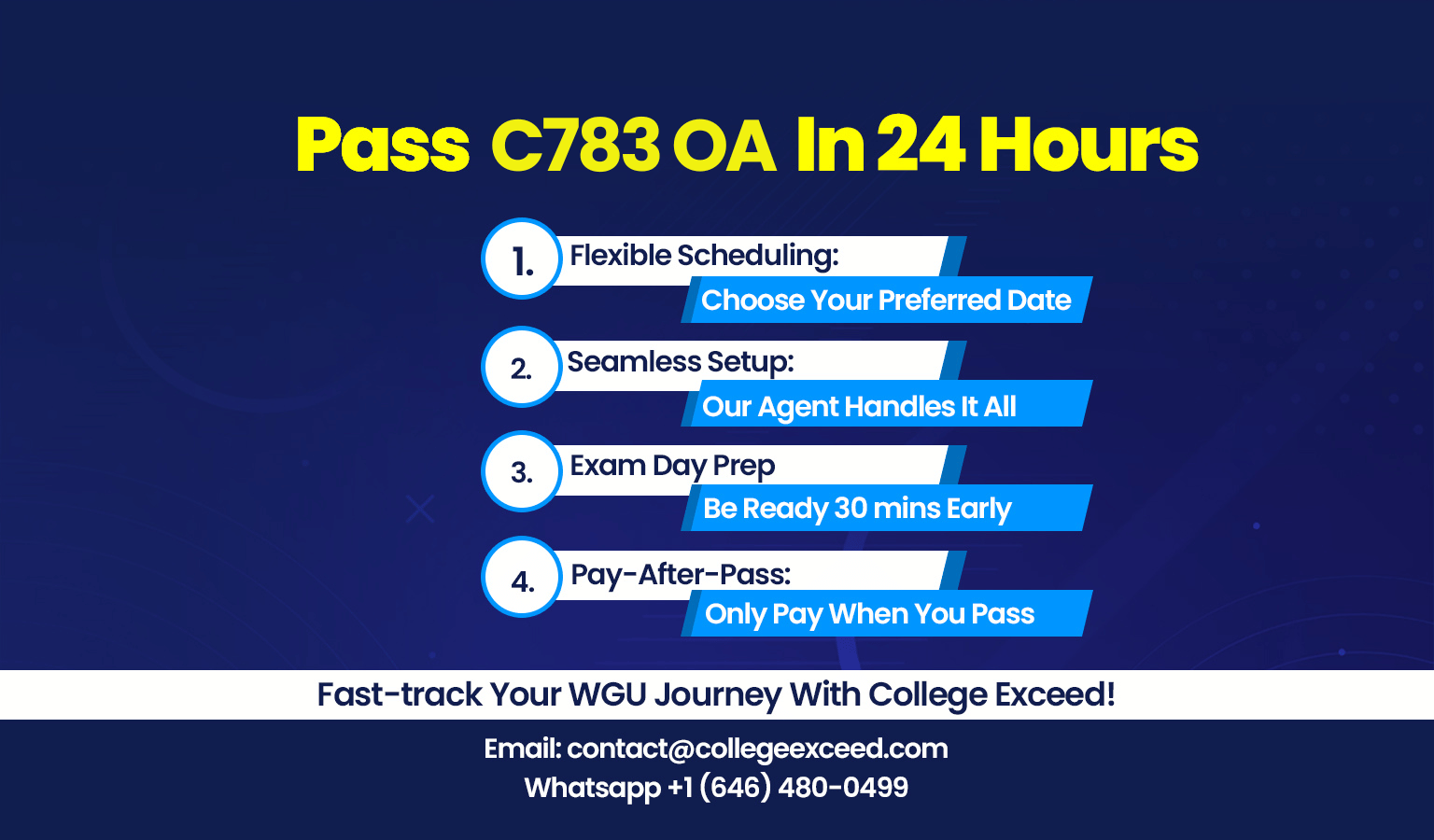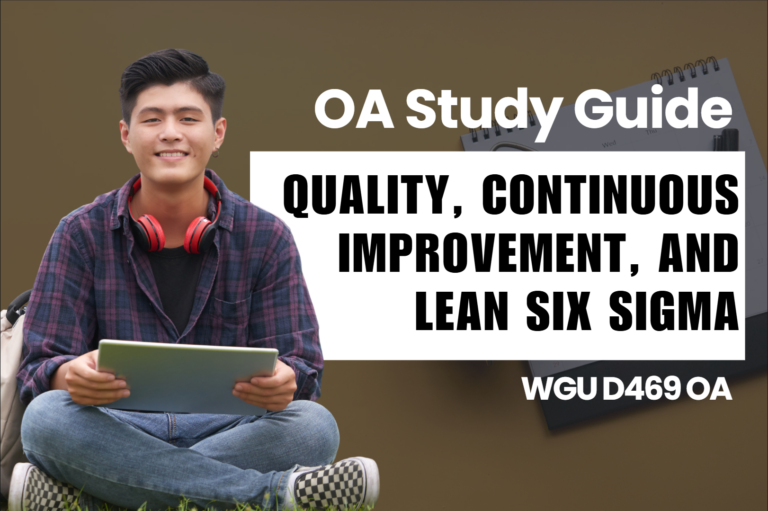If you are soon to attempt the Project Management WGU C783 course at WGU, then you are at the right blog. This course is an initial foundation course that paves the way to a better understanding of concepts and principles in project management. But don’t worry, we present you with a list of incredible buys! This page will provide you with all the information you will need to succeed in this class – ranging from what to anticipate when in class to how to prepare for the Objective Assessment (OA). Here, we present you with a week-by-week study schedule, external resources that you may find helpful, and finally, some tips and tricks from your fellow scholars. Also, we will end the article with the ‘FAQ’ to tackle all those questions that are still lingering at the back of your head. Therefore, whether you are new to working through legislation or need an extra nudge before the OA or even before the legislation review, this guide is present to save you time and make your way toward passing C783 less challenging.
Let’s dive in!
...
Project Management Overview: What You Need to Know📖
The Project Management C783 course at WGU can be described as a rich immersion into the subject area focusing on the most important elements which contribute to the provision of effective projects. This course is well in tune with the PMBOK Guide and comprises the five process groups and the 10 knowledge areas in project management. No matter whether you are looking to improve your knowledge of these foundational concepts or are in preparation for the CAPM certification exam, this course is for you.
Here is the list of topics that a learner will cover to the end of the course; The initial session focuses on understanding project management, and the setting that projects inhabit. You will then progress through the integrated project management area, in this area, you will learn how to: create project charters, and managerial strategies, and direct the execution of the project. This is so because this section is very important in providing a context for the organization to seek, plan, implement, evaluate, and conclude projects.
You will also study other important knowledge areas that are project scope, schedule, cost, quality, resources, communications, risk, procurements, and stakeholders. Every chapter is created in a way that gradually molds your competency in these areas using scenarios and application forms. For example, the knowledge of how to create a project management plan or how to manage scope would be extremely useful while answering an assessment and performing actual work on projects.
At some point, you will find yourself immersed in a detailed analysis of the tools, techniques, and deliverables to be expected in each of the process groups and so get an overall view of project management processes. The course is designed to systematically help you construct your proficiency ultimately then revisiting the Examination Content Outline, and that matches most of the requirements expected of a PMP.
Specific subject areas that are likely to appear with great frequency in the OA include project integration, scope, schedule, and cost controls, and therefore these should be given high priority. In other words, for this course, there are no prior conditions that must be qualified and met, and thus is open to all however there is a high expected level of commitment to work and achieve.
Study Guide for WGU C783 Project Management📝
About Project Management C783, you might think that it is practically impossible to pass this course, but that is not true: with an efficient schedule, things can go much more smoothly. Here’s a week-by-week breakdown to help you ace this course:
Week 1: Dive into the Textbook and Take Notes
First of all, you shall be required to read the necessary sections in the textbook. The best way is to pay attention to such concepts that the professor underlined in the particular chapters and were an important part of the course. As you study, try the quizzes at the end of each content area that is, at the end of each section. It will help you tighten your understanding, and these quizzes will be the best reminder of the studied material. Try not to read through it hastily: what you want to do is take brief, and very straight-forward notes. It is out to be very helpful when you are revising for the OA at some other time in the future.
Week 2: Attend Live Cohorts and Engage Actively
If there are live cohorts, be sure to attend them. These classes make it possible to deal with the content of the course in a more participative manner and get immediate responses from the instructor to your queries. If you have faith in the content the cohorts can present angles you could not otherwise perceive while studying on your own. It can also assist in reinforcing your learning of the course material as a participant.
Week 3: Explore Supplemental Resources (Optional)
This week, you can spend some of your time going through the additional readings enlisted later in the article. Although this step is not mandatory, it is very effective in gaining much broader insights into the discussed issues. Tutoring or other supportive literature may represent examples or explanations from another angle that would be better understood than a text alone. Nevertheless, these should be pursued if some topics are problematic or if the learner wants more than what a specific OA lays out.
Week 4: Do the Pre-Assessment (Pre-A)
This week is crucial—take the Pre-A and aim to score above 85%. The Pre-A is designed to mirror the OA and will give you a clear idea of what to expect. If you don’t hit that 85% mark on your first attempt, don’t worry. Retake the Pre-A as many times as necessary until you achieve your target score. Use the coaching report provided after each attempt to identify your weaknesses. Focus on these areas in your subsequent study sessions to ensure you’re fully prepared for the OA.
Week 5: Take the Objective Assessment (OA)
By now, you should feel confident in your knowledge and skills. Schedule your OA and approach it with a calm, focused mindset. Remember, the OA is your opportunity to showcase everything you’ve learned throughout the course. With thorough preparation, including your textbook readings, notes, live cohort participation, and Pre-A practice, you should be well-equipped to pass the OA with flying colors.
...
Top Resources for C783 OA 👨🏻🏫
∙ CAPM Exam Prep Course by Andrew Ramdayal on Udemy
Link: CAPM Certification Training Prep Course
This course is an excellent supplement for mastering project management concepts, particularly for those aiming to pass the CAPM exam. It’s a valuable resource to reinforce key topics covered in C783.
∙ PMBOK Video Course by David McLachlan on YouTube
Link: PMBOK Video Course
This YouTube playlist offers clear and concise explanations of the PMBOK Guide, making complex concepts easier to understand. It’s ideal for visual learners looking to grasp the material more effectively.
∙ CAPM Exam Prep Seminar by Joseph Phillips on Udemy
Link: CAPM Exam Cram Session PMBOK6
Joseph Phillips provides a thorough seminar that aligns with the PMBOK Guide, offering additional insights and study tips. It’s particularly useful for those preparing for the CAPM exam but is also highly relevant to C783.
∙ PMBOK® Guide 7th Ed Processes Explained with Ricardo Vargas on YouTube
Link: PMBOK Guide Processes Explained
Ricardo Vargas breaks down the processes in the PMBOK® Guide 7th Edition in an accessible and practical way. This video series is great for understanding the real-world applications of project management processes.
∙ PMP Group and Knowledge Area Mapping Game
Link: Project Management Process Group and Knowledge Area Mapping Game
This interactive game is a fun way to test and reinforce your understanding of the PMBOK® Guide’s process groups and knowledge areas. It’s a dynamic tool to help solidify your knowledge.
∙ PMBOK® Guide – Chapter Summaries by Project Prep on YouTube
Link: PMBOK Guide Chapter Summaries
Project Prep’s YouTube playlist offers quick, concise summaries of each chapter in the PMBOK® Guide. It’s perfect for quick reviews and pinpointing areas for further study.
...
C783 OA Tips for Success in Project Management📂
Passing the Objective Assessment (OA) for Project Management C783 can be a daunting task, but with the right approach, you can navigate through it successfully. Here are some practical tips and tricks to help you prepare effectively:
- Attend the Cohorts and Request Study Guides
One of the best ways to get ahead in this course is to attend the live cohorts, especially those led by Dr. Walker. His sessions are not only insightful but also tailored to help you understand the material in depth. Don’t hesitate to request his study guide—it’s packed with useful strategies and focused material that can make a significant difference in your preparation. - Master the 49 Processes
Understanding the 49 processes in project management is crucial. While memorizing them isn’t necessary, it’s helpful to write them out repeatedly. This practice will help you recognize patterns and better understand how the processes connect. The OA will test your understanding of these processes, so being familiar with how they fit together will give you a solid advantage. - Focus on Critical Path and Earned Value Management
Some of the basic knowledge that you need to have includes elements such as critical path method (CPM), and earned value management (EVM) among others. In the OA, you can get 2 or 3 questions that involve forward and backward passes and you should be very familiar with these. Also important is the knowledge of the Budget at Completion (BAC) in relation to Earned Value. You do not really have to complicate yourself with the numerous formulas involved but understanding how to arrive at EV, PV, and AC is of benefit for handling such questions. - Familiarize Yourself with Inputs, Tools, Techniques, and Outputs (ITTOs)
The OA provides a list of questions that are specific to the ITTOs of the several processes. Though they may appear to be a lot, it is useful to at least get a broad picture of the most significant ones. Knowing how the tools and techniques fit together with the processes will not only enable you in the OA but also during other project management scenarios. - Understand the Verbiage and Definitions
Like any profession, project management has its jargon, and for aspiring project managers to understand the PMBOK Guide it is helpful to define terms from the document. The OA will often ask questions that draw a line in terms of understanding of these terms, therefore familiarize yourself with the terms in full. Sometimes, the so-called simple definitions are really tricky and that is how one may get caught. - Practice with the Pre-Assessment (PA)
The Pre-Assessment (PA) is very helpful in order to assess your level of preparedness for the OA. As for the form, many students state the fact that the PA and OA, for instance, resemble each other, but the questions are different. Just translate your knowledge, and by utilizing the PA indicating the weak points, use more time on them and practice. Passing the PA with a good score can be evidence that you are qualified to take the OA.
When this strategy is incorporated into your study plan you will be in a good position to pass the OA and excel in the Project Management C783 course. Please bear in mind that comprehensive understanding is better than cramming and it is better to practice what is being taught whether it is right or wrong right from the time of exams to the practical management of a project.
...
Frequently Asked Questions: C783 Project Management❓
- What is the best way to study for the OA?
The best way to study is to follow a structured plan that includes reading the textbook, attending cohorts, taking the Pre-Assessment (PA), and using supplemental resources. Focus on understanding the 49 processes and practice key concepts like Critical Path and Earned Value Management.
- How similar is the PA to the OA?
Many students find the PA and OA to be quite similar in format and content, although the specific questions differ. The PA is an excellent predictor of your readiness for the OA, so aim for a score of 85% or higher on the PA before scheduling your OA.
- Do I need to memorize all the processes in the PMBOK Guide?
While memorization isn’t necessary, it’s important to understand how the processes fit together. Writing them out repeatedly can help you see patterns and better grasp the material. Focus on understanding the flow and interconnections rather than rote memorization.
- What are the most challenging topics in this course?
Students find studying some processes such as the Critical Path Method, Earned Value Management, Inputs, Tools, Techniques, and Outputs (ITTO) challenging. Give more time on these areas and you can use references like the cohort session and YouTube video to clear out the area.
- Are there any specific tools or techniques I should focus on for the OA?
Of course, you might have heard about the Critical Path Method, Earned Value Management, and, by the way, the major tools and techniques described in the PMBOK Guide. The OA will prove you in these areas so it is important that you have a good study and understanding of them.
- How can I effectively use the coaching report from the PA?
The coaching report highlights your strengths and weaknesses based on your PA performance. Use it to identify areas where you need more study and focus your efforts there. This targeted approach will help you improve your score on the OA.
- Is it necessary to use supplemental resources?
While the core materials of the WGU are enough, you can take additional sources to strengthen your position and get more points of view on the issue. That is why it is possible to involve such sources as YouTube videos or online games in the study process.
...
Conclusion: Excelling in Project Management📄
The course, Project Management C783, is arguably one of the most difficult, but it is not one that you cannot overcome. This knowledge along with effectively navigating through WGU materials along with other resources, and comprehensiveness rather than rote memorization of the content will prepare you for the OA. Do not forget to use the PA to assess your level of preparedness and adjust the learning process. You will not only be able to pass the course but, most importantly, obtain valuable skills in project management which will help in your future career. Good luck to you my friend and believe me when I say, you can do this!






